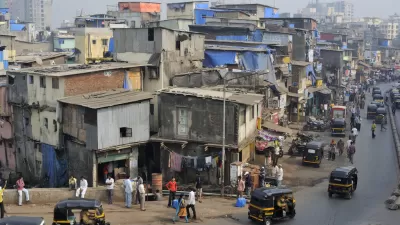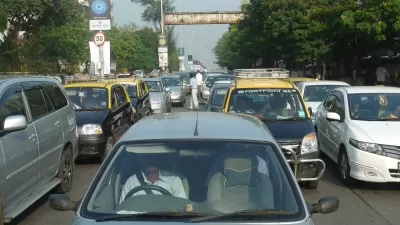In the 1970s and 80s, bottom-up slum upgrading schemes inspired by the ideas of British-born architect James F.C. Turner benefited tens of thousands of residents of Mumbai. Current policies incentivize top-down redevelopment, harming slum dwellers.
Matias Echanove and Rahul Srivastava, co-founders of URBZ: user-generated cities and The Institute of Urbanology, examine Mumbai’s Slum Rehabilitation Scheme, the primary tool used to improve the living conditions of slum-dwellers in the city, and find it severely lacking. "It encourages private developers to clear areas classified as slums by the municipality and build high-rise housing blocks in which each family receives a free 225-square-foot unit. In exchange, the developer gets valuable 'transferable building rights' on public land," they explain. "A government report on the Slum Rehabilitation Scheme described it as 'nothing but a fraud, designed to enrich Mumbai’s powerful construction lobby by robbing both public assets and the urban poor.'”
Instead, Echanove and Srivastava propose returning to the ideas promulgated by Turner: supporting local know-how and the use of locally available resources to improve slum conditions. "Our contention is that only by working within the existing fabric and with local actors can urbanists, architects, engineers and policy-makers contribute meaningfully to ongoing user-led improvement in homegrown neighborhoods," say the authors. "This is why we have just started a new project called Homegrown Cities that aims to demonstrate that an alternative to 'redevelopment' is possible. We want to combine our observations with relevant aspects of Turner-inspired schemes and adapt them to the contemporary context of Mumbai."
FULL STORY: Why Slum Upgrading Requires a Light Touch

Alabama: Trump Terminates Settlements for Black Communities Harmed By Raw Sewage
Trump deemed the landmark civil rights agreement “illegal DEI and environmental justice policy.”

Planetizen Federal Action Tracker
A weekly monitor of how Trump’s orders and actions are impacting planners and planning in America.

The 120 Year Old Tiny Home Villages That Sheltered San Francisco’s Earthquake Refugees
More than a century ago, San Francisco mobilized to house thousands of residents displaced by the 1906 earthquake. Could their strategy offer a model for the present?

Ken Jennings Launches Transit Web Series
The Jeopardy champ wants you to ride public transit.

BLM To Rescind Public Lands Rule
The change will downgrade conservation, once again putting federal land at risk for mining and other extractive uses.

Indy Neighborhood Group Builds Temporary Multi-Use Path
Community members, aided in part by funding from the city, repurposed a vehicle lane to create a protected bike and pedestrian path for the summer season.
Urban Design for Planners 1: Software Tools
This six-course series explores essential urban design concepts using open source software and equips planners with the tools they need to participate fully in the urban design process.
Planning for Universal Design
Learn the tools for implementing Universal Design in planning regulations.
Clanton & Associates, Inc.
Jessamine County Fiscal Court
Institute for Housing and Urban Development Studies (IHS)
City of Grandview
Harvard GSD Executive Education
Toledo-Lucas County Plan Commissions
Salt Lake City
NYU Wagner Graduate School of Public Service




























